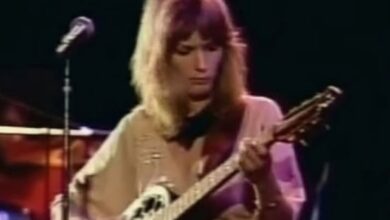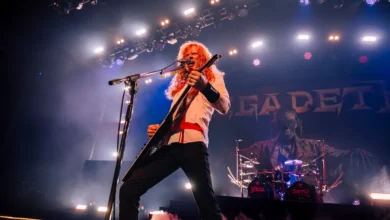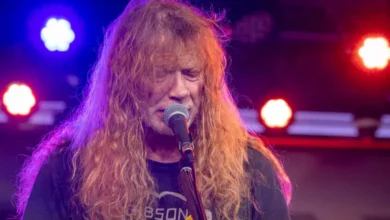Ann Wilson’s “Stairway to Heaven” Tribute Moves Led Zeppelin to Tears
Ann Wilson’s rendition of “Stairway to Heaven” at the 2012 Kennedy Center Honors has taken on a life of its own, becoming one of those rare performances where a familiar song feels reborn. More than a tribute, it unfolded like an emotional ambush designed to reach the surviving members of Led Zeppelin, the memory of John Bonham, and anyone who had ever lived inside the world of Led Zeppelin IV. From the first note, people sensed that Ann wasn’t simply revisiting a masterpiece — she was stepping into hallowed ground with unwavering courage and profound reverence, carrying the weight of decades of musical history in her voice.
The setting itself added a level of intensity that quietly shaped the entire evening. This wasn’t a casual concert, nor a loose award-show jam; it was the Kennedy Center Honors, performed before President Barack Obama, First Lady Michelle Obama, a hall full of influential figures, and, most importantly, Jimmy Page, Robert Plant, and John Paul Jones seated in illuminated balcony seats like watchful guardians of their legacy. Heart were assigned the impossible task of performing “the untouchable song” in front of the very men who crafted it, in a venue built for orchestras rather than rock epics. Ann later described the moment as blissful yet electrifying, explaining that every breath felt sharpened, almost otherworldly, as if she were channeling something larger than herself.
What many don’t realize is how deliberately the entire arrangement was structured to touch Led Zeppelin emotionally rather than overwhelm them with vocal power. Instead of going straight for theatrical climaxes, the performance begins with deliberate restraint. Nancy’s gentle acoustic guitar and Ann’s low, centered delivery shrink the space into something intimate, avoiding the grandiosity that often sinks cover versions. This was intentional — the sisters understood that aiming for sheer volume or imitation would cheapen the song. They chose instead to build slowly, honoring the original’s gradual ascent while incorporating orchestral warmth and a swelling choir to acknowledge the decades that had passed since the song first entered the world.
Behind that quiet confidence, however, was a level of tension that rarely makes it to the screen. Nancy later joked that you simply do not play the opening notes of “Stairway to Heaven” with frozen fingers in front of Jimmy Page, especially on a stage that felt cold enough to numb your joints. Rehearsal time with the full ensemble had been limited, and they both understood that guitarists across the world held strong opinions on every detail of the arpeggios. They needed to be precise without losing the essence of Heart, a band shaped both by Zeppelin’s influence and by its own decades of identity. Balancing homage with originality was the tightrope walk that helped transform the tribute into something unforgettable.
The staging itself operated like a visual storyline layered beneath the music. The opening shots frame Led Zeppelin in the balcony wearing their rainbow medallions, almost like elders presiding over a ceremonial offering. At first the lighting is soft, the arrangement spare. But with each movement of the song, new elements emerge: string players rising in intensity, choir members quietly entering the stage, musicians filling the space until it becomes a living mosaic. By the final verses, rows of performers in dark suits and bowler hats — a symbolic nod to John Bonham — create a tableau that feels like a ritual honoring both lineage and loss. Nothing about the staging was accidental; it was crafted to surround the surviving band members with memory.
Among the most emotionally charged elements is the timing of Jason Bonham’s entrance. Robert Plant reportedly had no idea Jason would be joining the performance until he appeared with the choir, wearing the same style of hat that had become iconic through his father. For Plant, whose friendship with John Bonham shaped much of his life, that moment carried a private emotional blow that cameras only partly captured. Many believe Plant’s tears flowed not only from the beauty of the arrangement but from the sudden collision of memory — the realization that Bonham’s son was anchoring the climax of a song the band had carried across decades and continents.
Ann has since explained that singing that night felt almost like leaving her own body behind. She described the experience as “orgasmic in terms of bliss,” not as a joke, but as an attempt to communicate how fully alive she felt — as if every nerve in her being was connected to the emotional weight of the song. She emphasized that nothing she expressed was staged or performed for the camera; the emotion ran “all the way down to the ground.” That raw sincerity is part of why the performance doesn’t resemble a polished TV segment — it feels like a spontaneous flood of feeling that simply happened to be broadcast.
What also shaped the authenticity of the performance was the long history Ann and Nancy shared with Led Zeppelin’s music. Heart had cut their teeth playing Zeppelin songs in clubs decades earlier, with Ann daring to take on Robert Plant’s soaring lines long before they became rock icons themselves. They understood the phrasing, the breathwork, the tension between fragility and force. When the Kennedy Center invitation arrived, they were uniquely qualified to honor the song without being intimidated by its myth. Their deep familiarity allowed Ann to make interpretive choices — like the subtle reshaping of phrases or her understated lower register at the start — while still respecting the original melodic spine.
A detail often missed on first watch is how Ann reinterprets the line “and it makes me wonder.” Rather than mimic Plant’s youthful, questioning tone, she sings it as someone reflecting across the span of decades. Her stretching of “wonder” sounds less like a riddle and more like lived experience — the voice of someone shaped by triumphs, heartbreaks, recoveries, and the long road of a life in music. Because Ann was in her sixties during the performance, the lyric carries a new kind of wisdom, transforming the song from a seeker’s inquiry into an elder’s reflection, and altering the emotional color of one of rock’s most familiar lines.
Ann’s command of dynamics and vibrato also forms a subtle narrative throughout the performance. Though known for her explosive belts, she spends much of the early sections letting her voice hover with control, minimizing vibrato and leaning into a conversational clarity. As the arrangement expands, she widens her vibrato, introduces more air and texture, and gradually lifts her tone until it matches the emotional sweep of the orchestra and choir. By the time she reaches the iconic “and as we wind on down the road,” her voice feels fused with the energy of the entire ensemble — a human instrument rising with the momentum of the music itself.
The choir’s presence adds another layer of meaning that goes beyond dramatic flair. Positioned behind Ann like a quietly powerful force, they turn the performance into a communal experience. While the original “Stairway to Heaven” centers on individual searching, this version suggests that the journey belongs to everyone who has carried the song through their lives. When the choir begins weaving harmonies under Ann’s lead, it feels like generations of listeners joining the moment, creating a shared emotional space where the audience’s memories are woven into the arrangement.
Watching Ann and Nancy interact reveals another emotional thread running beneath the music. Nancy begins with quiet focus, providing the delicate architecture of the song on acoustic guitar, while Ann stands as the emotional conduit in front. Yet Ann frequently glances toward Nancy, drawing comfort from a lifelong partnership formed long before fame. As the tribute expands into full orchestration and choir, Nancy shifts from gentle accompanist to rock guitarist, injecting grit and grounding the performance. Their synchronicity mirrors the unspoken communication that once existed between the members of Led Zeppelin, offering a parallel built on sisterhood and shared history.
The performance also subtly shifts the center of gravity in a song famously rooted in male rock mythology. With Ann delivering the lyrics, the narrative voice becomes female, transforming the tone without altering the structure. The “lady who’s sure all that glitters is gold” is no longer an abstract subject but part of a story articulated through a woman’s lived perspective. Supported by Nancy’s guitar work and the female voices within the choir, the tribute gently reframes the song without making any overt statements — it simply lets the music speak with a new balance of energies.
In the years since that night, Ann has openly reflected on what the performance came to mean for her. She admitted that she didn’t realize in the moment just how overwhelmed Robert Plant was until seeing footage later, capturing him wiping his eyes and appearing deeply moved. During the performance, her only focus was staying present, following the emotional thread of the song, and synchronizing with the orchestra. Only after it was over did she understand that the world now viewed it as one of the gold-standard examples of how to honor a rock classic while giving it entirely new life.
That singular performance also changed how people viewed tribute segments at major events. Before this, many tributes leaned on spectacle — celebrity cameos, fast medleys, and flashy arrangements meant to generate buzz. Heart’s interpretation demonstrated that a tribute could be bold, reverent, shocking, and deeply emotional all at once. It proved that giving an artist space and trust could lead to a result that honors the original without copying it. Later tributes in various genres were frequently compared to the emotional bar set that night, making it a benchmark for authenticity and depth.
Ultimately, what makes Ann Wilson’s “Stairway to Heaven” endlessly rewatchable is the sense that something unrepeatable took place — a merging of eras, memories, and emotional truths. Led Zeppelin were not only being honored but being invited to revisit their own legacy through new eyes. Jason Bonham’s presence carried the weight of lineage. Ann and Nancy revisited the music that had shaped their earliest dreams, now infused with decades of their own victories and struggles. The result was a performance that felt meticulously crafted yet alive with spontaneity, reaffirming that even the most familiar song can reveal new meaning when approached with heart, history, and fearless sincerity.





